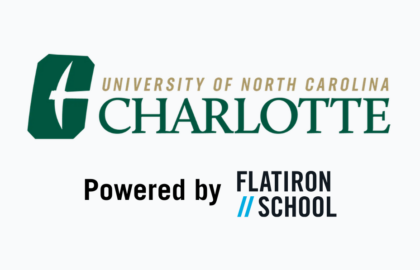This fall, Flatiron School and Citi have joined forces to promote the Citi Women Take Tech Scholarship, providing up to $1 million in total scholarships for women to participate in Flatiron School’s industry-leading, career-change software engineering or data science courses. As an extension of this initiative, we’re working together to spark meaningful conversations about women in tech—from launching a new career, to serving in leadership at the highest level.Recently, Yolande Piazza, CEO, Citi FinTech, joined Kristi Riordan, COO, Flatiron School, discussed their paths in tech, leadership styles, and how to create space for diverse voices to be heard at our Manhattan campus. In case you missed it, here are our favorite takeaways from their discussion:
This takes all of us
“Several years ago, somebody said to me, ‘We want you to run the women’s network for one of our technology groups” recalls Yolande. “I said, ‘no, thank you.’” Even though it was a great opportunity to empower women in a company as large as Citi, Yolande still had her doubts because it wasn’t just her task to solve.“I responded that I was not going to do it unless I have a male counterpart because it’s not a women’s problem. It’s actually everybody’s problem,” said Yolande. Yolande knew there was more work to do for women at Citi and across the tech industry. Citi recognizes that this is a critically important area and is committed to continuing to make progress. Additionally while speaking to a group of middle and high school girls, Yolande had realized the tech gender gap began well before women started their careers. Yolande discovered middle school girls treated everyone as equals. There was a sense of independence and the girls had aspirations to be astronauts, pilots or other lofty goals. A shift occurs in high school and girls no longer wanted to stand out. That change in mentality would have long-lasting ramifications and inspired Yolande to co-found Citi’s FUTURE | Women in I.T. program, which has inspired over 30,000 middle and high school girls across the US to consider pursuing careers in tech.
Be brave, not perfect
Yolande remembers a quote from Reshma Saujani, the founder of Girls Who Code. In her TED Talk, Reshma says we teach girls to be perfect and boys to be brave. Those early expectations are engrained in high school and shapes their future, notes Yolande. To break away from this cycle of thought requires establishing a community built on trust, says Kristi Riordan, COO of Flatiron School. Yolande says that having that belief in yourself, creating a community of trust, and holding yourself accountable has led to opportunity after opportunity in her career. “Once you find somewhere that’s the right cultural fit, there’s nothing stopping you,” said Yolande.“Be bold, be curious, and be courageous” is Yolande’s motto that’s guided her throughout her career. She’s not afraid to raise her hand or put her job on the line for something she’s passionate about.
Communication is key
Not surprisingly, men and women communicate differently. As Yolande progressed in her career, she recognized that “I feel” statements were not well-received by her male counterparts or bosses. Boiling a situation down into three bullet points with a clear action and impact helped Yolande communicate effectively.Once she became a leader, she had to develop her own style. She knew her male colleagues wanted a direct form of communication. Her female colleagues, however, had a more conversational approach—which included passion and more natural language—when addressing situations. She’s used that experience to develop her own leadership style that resonates with both male and female colleagues.
Be yourself even when you fail
Through everything, Yolande believes you should always be yourself. All the ingredients to do something great are inside you already. Don’t worry about being perfect, own who you are even you if you happen to be different, and don’t let anyone put you down. The naysayers are a small minority and the vast majority of the company are so glad to have you on the team, according to Yolande. There may be times when you fail and that’s fine. Yolande recommends owning and learning from failure. It’s another way to hold yourself accountable and you’ll grow once you accept and analyze why that failure happened. Once you do that, you’re unlikely to make that mistake again.




